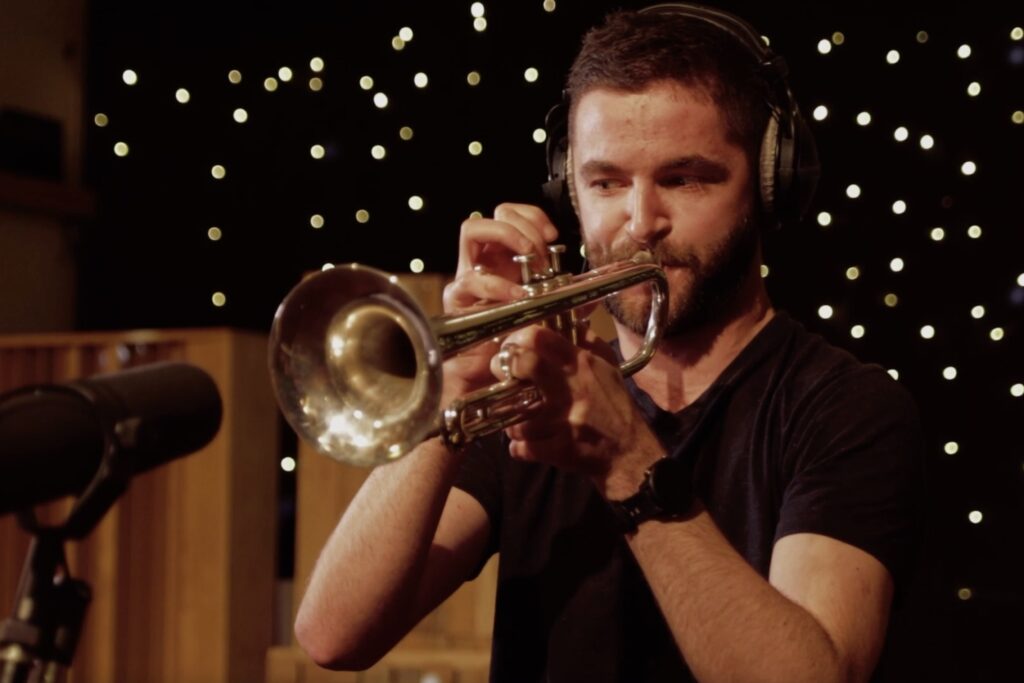Insights from our 2023 Composer in Residence Max Grynchuk
Often, when audiences attend a WAYJO concert, they experience the polished, well-rehearsed, and refined versions of the works.

However, behind each new piece lies a lengthy process of composition. From finding inspiration and crafting the title to recognising musical influences, forming a narrative or ‘story’ behind the work, writing and re-writing the music, collaborating with band members, and so much more—it’s a comprehensive journey to create just a single new work.
That’s why we wanted to give an insight on what it takes to be a composer writing for a big band, and who better to ask than our 2023 Composers-in-Residence?
We recently had the opportunity to ask Max Grynchuk for his experience of crafting his new work, ‘Once Upon A Time in the West,’ for WAYJO as part of our Composer in Residence program.
Max Grynchuk
Can you share a bit about your background as a composer?
I began composing music at age 9 by writing short piano etudes. I picked up the trumpet in high school and joined my school’s big band program. From there I quickly became absorbed in big band music and began trying to write for the ensemble. I was fortunate to have amazing support and mentoring from various teachers and band directors and by the time I finished high school I had written several charts. I continued to write for big bands throughout my time at university and have been lucky enough to record three albums with my own big band. I currently have over 40 charts available for purchase on my website and have sold music to bands and music programs in Japan, US, UK, and France amongst others.
Tell us about your composition and where the inspiration came from.
I like to write music with a story arc in mind, and when it came to writing this commission, I wanted to do something completely different to what I had previously written. Since I was writing for a band in WA, I thought it would be fitting to write a spaghetti-western big band chart. I listened to a variety of music and watched clips from a handful of spaghetti-western movies to get an idea of how I could incorporate these tropes into a big band work. I wrote a loose plot synopsis which I used to base the structure of my piece on. From there I wrote the music to reflect what was happening in the story, covering everything from a bar-brawl to a duel, and even a train heist. The name of the tune came to me whilst jogging, so when I got home, I was disappointed to find out that I was stealing the title from one of the most famous spaghetti-western films of all time.
Can you share some of your musical influences?
I have been listening to big band music since early high school so there are many amazing writers who have inspired me. Bob Curnow’s arrangements of the music of Pat Metheny and Lyle Mays had a big influence on my writing, particularly with how he utilised the ensemble. Other writers and arrangers I listened to a lot throughout my formative years were Michel Camilo, Bert Joris, Toshiko Akiyoshi, and Maria Schneider, as well as playing a lot of Bob Minter, Thad Jones, and Sammy Nestico charts in various big bands during high school and uni.
What has been your biggest lesson/takeaway as WAYJO’s Composer in Residence?
I really enjoyed the process of writing for such an advanced ensemble where there weren’t really any limitations to what I could write. Also, having previously had to write to a strict deadline, I found that I was able to refine my process and complete this commission with much less stress than previous projects of a similar nature.
How have you worked with the Musical Director and orchestra to bring your composition to life?
I was lucky enough to fly over from Adelaide to listen to the band record the piece. It was nice to be able to offer my thoughts on a few things, but also great to see how Mace and the band interpreted what I had written and how they added their own character to it. It was definitely great to be there in person on the day to clarify parts of my whacky vision, and hopefully the band found that some of the chart made more sense after that.
Where to from here? What other musical projects are you working on?
I am currently chipping away on a few new compositions for a gig with my big band in October. I’m hoping that set will be the foundation for a new album which I would love to record sometime in 2025. Having previously recorded three albums in the space of two years, I’m aiming to do things at a less frantic pace this time around.

